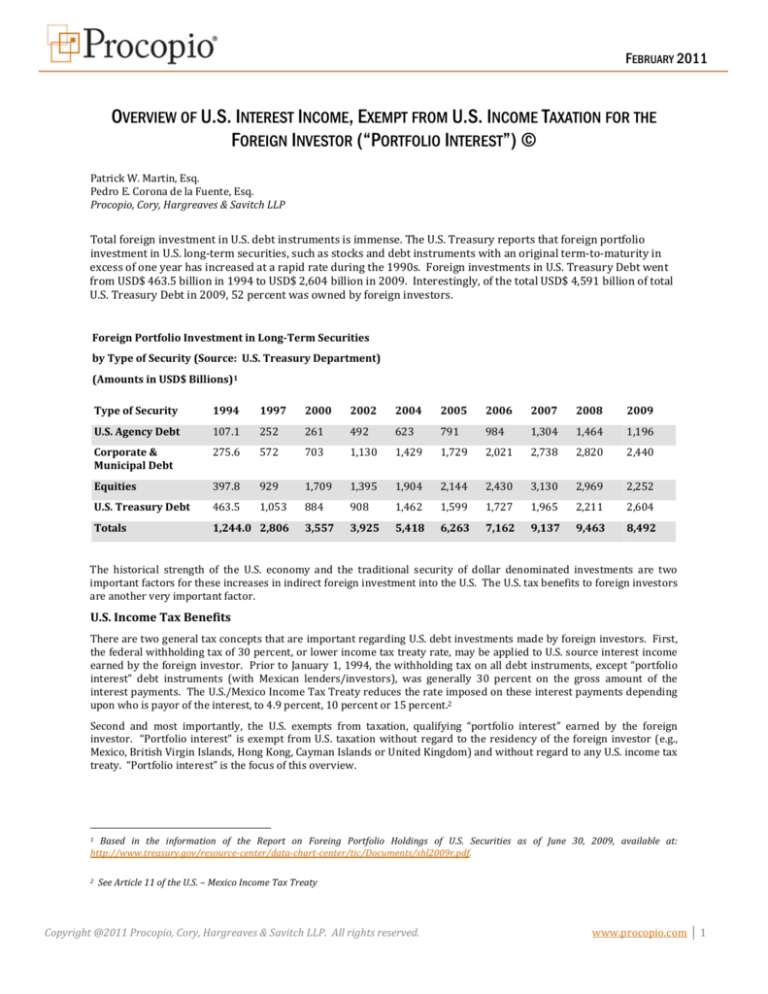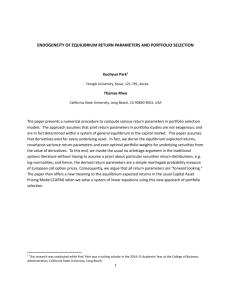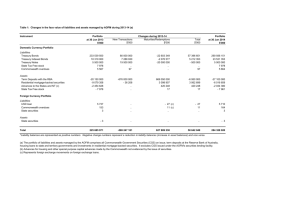
FEBRUARY 2011
OVERVIEW OF U.S. INTEREST INCOME, EXEMPT FROM U.S. INCOME TAXATION FOR THE
FOREIGN INVESTOR (“PORTFOLIO INTEREST”) ©
Patrick W. Martin, Esq. Pedro E. Corona de la Fuente, Esq. Procopio, Cory, Hargreaves & Savitch LLP Total foreign investment in U.S. debt instruments is immense. The U.S. Treasury reports that foreign portfolio investment in U.S. long‐term securities, such as stocks and debt instruments with an original term‐to‐maturity in excess of one year has increased at a rapid rate during the 1990s. Foreign investments in U.S. Treasury Debt went from USD$ 463.5 billion in 1994 to USD$ 2,604 billion in 2009. Interestingly, of the total USD$ 4,591 billion of total U.S. Treasury Debt in 2009, 52 percent was owned by foreign investors. Foreign Portfolio Investment in Long­Term Securities by Type of Security (Source: U.S. Treasury Department) (Amounts in USD$ Billions)1 Type of Security 1994 1997 2000 2002 2004 2005 2006 2007 2008 2009 U.S. Agency Debt 107.1 252 261 492 623 791 984 1,304 1,464 1,196 Corporate & Municipal Debt 275.6 572 703 1,130 1,429 1,729 2,021 2,738 2,820 2,440 Equities 397.8 929 1,709 1,395 1,904 2,144 2,430 3,130 2,969 2,252 U.S. Treasury Debt 463.5 1,053 884 908 1,462 1,599 1,727 1,965 2,211 2,604 Totals 1,244.0 2,806 3,557 3,925 5,418 6,263 7,162 9,137 9,463 8,492 The historical strength of the U.S. economy and the traditional security of dollar denominated investments are two important factors for these increases in indirect foreign investment into the U.S. The U.S. tax benefits to foreign investors are another very important factor. U.S. Income Tax Benefits There are two general tax concepts that are important regarding U.S. debt investments made by foreign investors. First, the federal withholding tax of 30 percent, or lower income tax treaty rate, may be applied to U.S. source interest income earned by the foreign investor. Prior to January 1, 1994, the withholding tax on all debt instruments, except “portfolio interest” debt instruments (with Mexican lenders/investors), was generally 30 percent on the gross amount of the interest payments. The U.S./Mexico Income Tax Treaty reduces the rate imposed on these interest payments depending upon who is payor of the interest, to 4.9 percent, 10 percent or 15 percent.2 Second and most importantly, the U.S. exempts from taxation, qualifying “portfolio interest” earned by the foreign investor. “Portfolio interest” is exempt from U.S. taxation without regard to the residency of the foreign investor (e.g., Mexico, British Virgin Islands, Hong Kong, Cayman Islands or United Kingdom) and without regard to any U.S. income tax treaty. “Portfolio interest” is the focus of this overview. 1 Based in the information of the Report on Foreing Portfolio Holdings of U.S. Securities as of June 30, 2009, available at: http://www.treasury.gov/resource­center/data­chart­center/tic/Documents/shl2009r.pdf. 2
See Article 11 of the U.S. – Mexico Income Tax Treaty
Copyright @2011 Procopio, Cory, Hargreaves & Savitch LLP. All rights reserved.
www.procopio.com │ 1
To reiterate, “portfolio interest” from U.S. sources received by nonresident aliens and foreign corporations is not subject to any U.S. withholding tax and is, therefore, an excellent tool to finance certain U.S. investments.3 The definition of what is portfolio interest is fairly complicated and is designed to benefit only nonresident individuals and foreign corporations. U.S. citizens and resident aliens must pay tax on such interest. Portfolio interest consists of registered obligations4 which are discussed briefly below. Registered Obligations A debt instrument is a registered obligation if: (1) the obligation is registered as to both principal and any stated interest and any transfer of the obligation may be accomplished only through the surrender of the old instrument to the new holder, or (2) the contractual right to the principal and stated interest can be transferred to another person only through a book‐entry system; and (3) the U.S. withholding agent5 receives a statement that the owner is not a U.S. person6. In the case of U.S. Treasuries, the U.S. Treasury Department has “only issued [Marketable Treasury Securities] securities in book‐entry form” since 1986. Indeed, an “overwhelming amount (99.84 percent of outstanding marketable securities) exist in book‐entry form. Securities in book‐entry form exist not as printed certificates but rather as computer records on . . . [the Treasury Department’s] books and on the books of banks and government securities brokers and dealers.”7 Special Restrictions In addition to the requirements set forth above, “portfolio interest” does not include interest paid to any of the following types of foreign investors: 1.
Anyone who owns 10 percent or more of the total combined voting power of all classes of stock entitled to vote in the U.S. borrower; 2.
A foreign bank on an extension of credit in the ordinary course of its trade or business; or 3.
A controlled foreign corporation from a related person. Also, any interest that is “contingent interest” and is determined with reference to receipts, sales, etc., does not qualify as “portfolio interest.” Finally, there are complicated “attribution rules” that apply to the 10 percent shareholder restriction described above. For example, if Father (F) owns 100 percent of U.S. corporation (U.S. Corp) and his two children (C1 and C2) both own 50 percent each of the foreign lender corporation (FC), then F is deemed to be the owner of FC by virtue of C1 and C2s’ actual ownership in the foreign corporation. Similarly, if a subsidiary of FC2 obtains a loan from U.S. Corp, the interest payments would not qualify. Summary Although many technical requirements must be satisfied to assure a foreign investor that the U.S. interest is “portfolio interest,” the tax benefits are significant to both the foreign lender who pays no U.S. tax and the U.S. borrower (who may be able to deduct the costs of interest payments it makes to the foreign investor). I.R.C. §§871(h) and 881(c). The term “portfolio interest” includes certain bearer obligations targeted to foreign persons (i.e., non U.S. persons) issued before March 18, 2012. See § 502 of the HIRE Act. 3
4
I.R.C. §§163(f) and 871(h) The withholding agent that receives the certificate of foreign status must make an information return on IRS Form 1042S of the payment with respect to which the certificate of foreign status is required for the calendar year. The withholding agent must attach the certificate (IRS Form W­8BEN) along with the IRS Form 1042S. 5
The statement must certify that the beneficial owner is not a citizen or resident of the U.S., and must set forth the name and address of the beneficial owner. This statement requirement can be made either by the beneficial owner or by securities clearing organization, a bank, or other financial institution that holds customers' securities in the ordinary course of its trade or business. For instance, if a corporation commonly holds securities for its nonresident alien customers, it could provide the statement to the U.S. withholding agent that would otherwise withhold the rate of tax from the interest payment. This requirement is met if the institution that initially holds the customers' securities in the ordinary course of its trade or business states under penalty of perjury that it has received from the beneficial owner an IRS Form W­8BEN stating that the owner is a non­resident alien. 6
7
www.publicdebt.treas.gov/.
Copyright @2011 Procopio, Cory, Hargreaves & Savitch LLP. All rights reserved.
www.procopio.com │ 2
The diagram below (in USD$ billions) summarizes the rapid increase in foreign investment in the U.S. (much of which qualifies as “portfolio interest” and therefore exempt from U.S. taxation). It appears this trend of increased foreign portfolio investment will only continue. Foreign Portfolio Investment in Long-Term U.S. Securities
$3,500
$3,000
$2,500
U.S. Agency Debt
U.S. Treasury Debt
$2,000
Corporate Debt
Equities - Stock
$1,500
$1,000
$500
$1994
1997
2000
2001
2002
2003
2004
2005
2006
2007
2008
2009
Patrick W. Martin is a U.S. lawyer licensed in California and Washington, D.C. and specializes in international tax and related international law­matters. Mr. Martin is the partner in charge of the international tax practice group of the Tax Team with the San Diego based law firm of Procopio, Cory, Hargreaves & Savitch LLP. He is a Past Chair of the International Tax Committee of the State Bar of California Taxation Section. He was awarded the V. Judson Klein Award by the Taxation Committee of the State Bar of California in 2010. He received his J.D. from the University of San Diego School of Law, has passed the Certified Public Accountant’s exam, previously worked for the Internal Revenue Service, and studied postgraduate law studies in international business transactions at the Escuela Libre de Derecho, in Mexico City. Reach him at 619.515.3230 or patrick.martin@procopio.com. Copyright @2011 Procopio, Cory, Hargreaves & Savitch LLP. All rights reserved.
www.procopio.com │ 3










